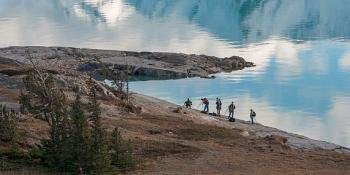An Alberta county drafted big tourism plans. Then came the coal leases
Marla Zapach tells guests at the backcountry cabins she runs with her partner that if you sit around the campfire and howl just right — but only if it’s just right — the local wolf pack will howl back.
Zapach runs Skadi Wilderness Adventures in the Wapiabi Provincial Recreation Area, west of Rocky Mountain House, Alta. The cabins are in the middle of the Rocky Mountain wilderness, in an area frequented by grizzlies, black bears, elk and wolves. Guests can hike, ski or snowshoe up to 25 kilometres to reach the cabins. No motorized access is allowed.
It’s a quiet reprieve for Zapach’s international clientele, she told The Narwhal. Her company markets the setting as “a pristine location far away from human activity.â€
But the Alberta government has moved to change all of that by approving coal leases that butt right up against the land her cabins sit on.
Zapach is concerned about the impact of coal leases and future coal mining on tourism in Clearwater County, which covers a large swath of the eastern slopes southwest of Edmonton.
The county covers approximately 18,700 square kilometres, including parts of the eastern slopes of the Rocky Mountains. The Alberta government rescinded its 1976 coal policy last summer and much of the county is now newly available to companies looking to build open-pit coal mines.
Coal leases now cover nearly 10 per cent of the county’s area, according to data from the Canadian Parks and Wilderness Society. The area of coal leases has more than quadrupled since the government’s announcement that the coal policy would be rescinded, according to the group.
If mines go ahead nearby, Zapach told The Narwhal it’s very likely she’ll have to “reconsider†her business. The new coal leases come at a time when the tourism industry is struggling with decreased business as a result of the COVID-19 pandemic.
The lease next door, she said, encompasses the water source the company uses for drinking water for visitors The routes those howling tourists hike to get to the cabins is now potentially open for coal development. The area is also open to forestry, she said, but added that forestry companies consult with her business prior to logging.
“Tourism … is not compatible with coal mining,†she said. “You will not be able to do both in these areas.â€




